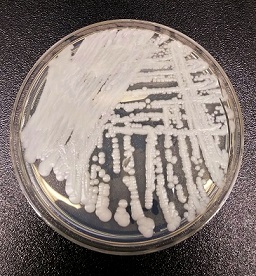Candida auris
Updated Dec. 9, 2019

The Maryland Department of Health (MDH) has been investigating several cases of a yeast, or fungus, called Candida auris, or “C. auris.” This fungus can be hard for laboratories to identify, is often resistant to many types of anti-fungal drugs making it difficult to treat, and can spread easily in healthcare settings. C. auris was first identified in Japan in 2009, and has been detected in many different countries and in parts of the United States, including in Maryland. Previous cases in Maryland were likely acquired in places outside of Maryland where C. auris was already known to be spreading; however, recently detected cases were likely acquired in Maryland.
Symptoms and Treatment of C. auris
· Patients can carry C. auris on their body, even if it is not making them sick, which is called colonization.
· Most people who carry C. auris do not get sick from it and do not require treatment.
· If someone develops an infection with C. auris, their symptoms might not be noticeable because patients with C. auris infection are often already sick in the hospital with another serious illness or condition.
· Symptoms of C. auris infection will depend on the part of the body affected. C. auris can cause many different types of infections, such as bloodstream infections, wound infections, and ear infections.
· Because symptoms can vary greatly, a laboratory test is needed to determine whether a patient has a C. auris infection.
· C. auris mainly affects patients who already have many medical problems, and who have weakened immune systems or have devices like tubes going into their body.
· Healthy people, including healthy healthcare workers, usually don’t get C. auris.
· While C. auris is often resistant to some medications used to treat infections with fungus, most C. auris infections can be treated with a class of medications called echinocandins.
Transmission of C. auris
· Patients can spread C. auris from their body to other people or nearby objects, especially in healthcare settings such as hospitals and nursing homes.
· Spread can occur even when patients are not sick with C. auris and only have it living on their skin (i.e. when they are colonized).
· C. auris commonly spreads to and lives on equipment and surfaces in healthcare settings; special cleaning products are needed to kill C. auris on these surfaces. Specifically, products registered on the U.S. Environmental Protection Agency (EPA) List K are recommended for cleaning and disinfecting environments possibly contaminated with C. auris.
· Healthcare providers should use special precautions around patients known to have C. auris to reduce the chance of spreading the fungus to other patients. In acute care settings (i.e. hospitals), these precautions include placing the patient in a room without a roommate, wearing gowns and gloves when caring for the patient, and ensuring good hand hygiene is performed by providers, family members, and the patient. Specific precautions used in nursing homes might differ, and facilities should contact Maryland Department of Health to discuss individual situations.
Testing for C. auris
· The Maryland Department of Health recommends testing for patients currently admitted to hospitals or residing in certain nursing homes, who have spent time in the same unit in a hospital or nursing home as another person with known C. auris, to see if they are carrying the fungus. There is no cost for this testing, which is currently only available through CDC’s Antibiotic Resistance (AR) Laboratory Network. Contact the Maryland Department of Health or see Maryland’s AR Lab Network website for more information.
· In general, testing is not recommended for persons who do not have symptoms of infection with C. auris and who are not currently hospitalized or likely to be hospitalized soon.
· Testing of the environment or equipment for C. auris is not routinely recommended.
· Testing of healthcare workers or family members who care for patients with C. auris (or an exposure to C. auris) is not routinely recommended.
Cases of C. auris in Maryland, as of December 9, 2019:
Year Confirmed Clinical Cases Confirmed Screening Cases
2016 1 0
2017 1 0
2018 1 1
2019 6 9
Clinical cases are based on cultures or culture-independent diagnostic testing from specimens collected during the course of clinical care for the purpose of diagnosing or treating disease and have been confirmed as C. auris in the laboratory. Screening is when swabs are collected from patients to determine whether or not they may unknowingly be carrying the organism somewhere on their bodies without signs of active infection. [See Council of State and Territorial Epidemiologists case definition].
Information for the Public
· MDH Candida auris Fact Sheet
· CDC: Candida auris General Information fact Sheet
o Español
o Vietnamese
o Korean
· CDC: Candida auris Information for Patients and Family Members
· CDC: Additional fact sheets for patients about testing and colonization
Information for Infection Preventionists
· General Information
o Español
· CDC Infection Prevention and Control for Candida auris
· List K: EPA’s Registered Antimicrobial Products Effective against Clostridium difficile Spores
Information for Healthcare Providers
· Healthcare Professionals Fact Sheet
· Treatment and Management of Infections and Colonization
· MDH C. auris Clinician Letter
o Clinician Letter 8/26/19 Update

